“Expensive guitar vs expensive amp?” It’s the eternal question that’s rocked the world of electric guitar enthusiasts who don’t have the money to buy both! Are you drawn to the allure of a high-end guitar, with its promise of perfect tones and stage-ready looks? Or does the raw power and versatility of an expensive amplifier call your name?
In this article, we’ll explore this thrilling debate, dissecting the pros and cons, unraveling the mysteries, and guiding you to a decision that could very well shape your musical destiny!
You can use the table of contents below to take you to the area that interests you. Click on the little box to open it and then click on the section of the article you want to read, or you can read from start to finish if you want the full guitar versus amp experience!
The Short Answer
The decision to buy or upgrade to an expensive guitar or amplifier is a personal one, shaped by your musical goals, preferences, stage of development, and budget. It’s about finding the tools that will help you grow, express yourself, and enjoy your musical journey to the fullest. A more expensive guitar or amp or adding effects pedals to your rig might just be your answer.
Keep On Reading (Below) To Learn More
Understanding The Basics
What Makes A Guitar Expensive?
An expensive guitar isn’t just about aesthetics; it’s a combination of factors that contribute to its high price tag.
Premium materials such as top-grade woods and metals are often used, giving the guitar a beautiful appearance and a unique sound quality. The craftsmanship involved is typically meticulous, with skilled artisans putting in hours of work to ensure perfection.
Brand reputation also plays a role, as renowned manufacturers are known for their quality and consistency.
An expensive guitar’s unparalleled sound quality and playability can offer richness and depth that can inspire creativity!
What Makes An Amplifier Expensive?
Expensive amplifiers, while less glamorous, are equally vital in the world of electric guitars. The power they provide can be a game-changer, allowing for a range of volumes and tones that can suit any playing style.
Features such as multiple channels, equalization controls, and built-in effects offer versatility and control, enabling you to shape your sound precisely.
The build quality of an expensive amplifier is designed to last, often constructed with robust materials that can withstand the rigors of touring and frequent use.
Sound enhancement is another critical factor, as a high-quality amplifier can make even a budget-friendly guitar sound better, providing clarity and warmth that enhances your playing experience.
The Beginner’s Perspective
I often find that beginning guitar players become mesmerized by the latest and greatest musical equipment. I know it happened to me when I first began playing the electric guitar, and it still does (more about guitar acquisition syndrome below)! I wanted an Olympic White Stratocaster and a wall of Marshall amps, just like Jimi Hendrix used!
For those new to the electric guitar, the choice between an expensive guitar and amplifier can be overwhelming. So, it’s essential to recognize that starting simple is often the best approach.
While the allure of high-end equipment is undeniable, focusing on what feels and sounds right for your playing style and musical preferences is more critical.
Investing in a moderately priced guitar and amplifier that align with your needs can provide a satisfying and inspiring playing experience without breaking the bank.
The Personal Connection To Your Guitar And Amp
When it comes to music, especially the world of rock and roll, the connection between a musician and their instruments is something sacred, almost mystical. It’s not just about wires, wood, and electronics; it’s about soul, expression, and identity.
The Allure Of Expensive Equipment
Investing in an expensive guitar or amplifier isn’t merely a financial decision; it’s an emotional one. The allure of high-end equipment goes beyond its sleek appearance or technical specifications. It’s about the promise of a sound that can capture your unique musical voice.
An expensive guitar, with its finely crafted body and perfect balance, can become an extension of yourself. It’s not just an instrument; it’s a partner in your musical journey, resonating with every note you play.
An expensive amplifier, on the other hand, is like the engine that powers your musical vehicle. It takes the raw energy of your playing and shapes it, amplifies it, and sends it out into the world. It’s the force that turns your personal expression into a sonic experience that others can feel.
Why A Personal Connection Is Key
Together, an expensive guitar and amp form a symbiotic relationship, each enhancing the other’s capabilities, creating a whole that’s greater than the sum of its parts. It’s a connection that can inspire creativity, boost confidence, and elevate your performance to new heights.
But this connection isn’t automatic or guaranteed. It requires time, effort, and a deep understanding of what you want from your music. It’s about finding the right match, the gear that speaks to you and resonates with your musical soul.
Whether you’re a budding rock star dreaming of sold-out arenas or a passionate hobbyist playing for the love of music, the connection to your guitar and amp is a deeply personal and significant aspect of your musical life.
And, apart from financial considerations, that is the true essence of the “expensive guitar vs expensive amp” debate. It’s a decision that goes to the heart of who you are as a musician and what you want to achieve with your music!
Budget Considerations
Ah, the budget – the unglamorous yet essential aspect of any musician’s journey. Whether you’re a garage band hero or a touring professional, the question of “expensive guitar vs expensive amp” often boils down to what your wallet can handle. But fear not, for budget considerations don’t have to be a buzzkill. Let’s explore how to make the most of your hard-earned cash.
Low Budget Choices
Starting with a limited budget? You’re in good company. Many legendary musicians began with humble gear. The key is to know where to invest.
If your heart is set on a high-end guitar, consider looking for used or discounted models. Sometimes, a little wear and tear can add character!
Don’t overlook the value of a quality but affordable amplifier. Many brands offer models that deliver great sound without spending all your money!
Remember, a budget-friendly start doesn’t mean compromising on quality. It’s about finding the right balance and making smart choices that align with your musical goals.
However, you need to balance your musical desires, needs, and budget to get the gear that best suits your purpose, sound, and playing style.
If you have very little money to spend, it’s better to put it into a decent guitar and get a much cheaper amp or wait on getting an amplifier until you can afford it. When beginning players buy a cheap guitar that’s very difficult to play, it may very well discourage them from putting in the effort required to become a good musician.
There’s a great video at the end of this article that shows you some of the starter packs available from Fender for beginners, especially if you have a low budget.
High Budget Choices
If you’re fortunate enough to have a more generous budget, the world of expensive guitars and amplifiers opens up like a backstage pass to a rock concert.
Investing in a top-tier guitar can be a game-changer. The craftsmanship, materials, and sound quality can elevate your playing experience to new levels.
A high-end amplifier can transform your sound, offering features and versatility that can adapt to various styles and venues.
Here’s where you have the opportunity to buy a guitar that looks, plays, and sounds the way you want it to and get an amplifier that can really take the guitar’s performance to the next level!
But even with a high budget, wisdom is key. It’s not about buying the most expensive gear; it’s about investing in what truly resonates with you and your music.
The Bottom Line
The “expensive guitar vs expensive amp” debate isn’t just about the glitz and glamour of high-end gear. It’s a decision that requires careful consideration of your budget, needs, and musical aspirations. Whether you’re pinching pennies or ready to splurge, the right choices can lead to a fulfilling and inspiring musical journey.
So, take the time to explore, research, and try out different options. Your perfect guitar and amp are out there, waiting to be discovered, ready to become part of your rock ‘n’ roll story.
Pros And Cons Of Expensive Musical Equipment


Understanding the pros and cons of each option when buying guitars and amps can help you hit all the right notes in your musical journey. Let’s break it down.
Expensive Guitars
Pros
High-end guitars often offer superior sound, with rich tones and clarity that can make every note sing. The quality of the wood, craftsmanship, and pickups can create a tone that’s both warm and articulate. The attention to detail in expensive guitars is second to none, providing a playing experience that feels as good as it sounds.
Often designed with the player’s comfort in mind, a great guitar offers smooth playability and a balanced feel. The quality of the fretwork, neck, and body can make playing a joy rather than a chore.
Let’s face it, an expensive guitar often looks stunning, and who doesn’t want to look cool on stage?
Quality guitars tend to hold their value well, making them a wise investment in the long run.
Cons
The cost can be a significant barrier, especially for beginners or those on a tight budget. Expensive guitars often require more care and maintenance, which can be time-consuming and costly.
| Guitar Features | Cons For Cheaper Models | Pros For Expensive Models |
|---|---|---|
| Sound Quality | May Lack Clarity and Richness | Superior Sound Quality |
| Craftsmanship | Less Attention to Detail | Exceptional Craftsmanship |
| Aesthetics | Basic Appearance | Stunning Aesthetics |
| Resale Value | May Depreciate Quickly | Good Resale Value |
| Maintenance | Less Care Needed but Shorter Lifespan | Requires More Care but Lasts Longer |
Expensive Amplifiers
Pros
High-end amplifiers offer a wide range of features and settings, allowing you to shape your sound for different genres and venues. An expensive amp can deliver the punch and volume needed for live performances, ensuring you’re heard loud and clear.
Bells and whistles, such as multiple channel switching and selectable audio power output levels, can open up a world of playing possibilities!
Quality amplifiers can make even a modest guitar sound good, providing a cost-effective way to elevate your sound. Built to last, expensive amplifiers are often more robust and reliable, standing up to the rigors of gigging and touring.
While often overlooked, a quality amplifier can also make a visual statement. The design, branding, and even the glow of the tubes can add a touch of class to your stage setup.
Cons
Just like their guitar counterparts, expensive amplifiers can put a dent in your wallet. High-end amps can be heavy and cumbersome, making transportation a challenge, especially if you’re a one-person roadie.
| Amplifier Features | Cons For Cheaper Models | Pros For Expensive Models |
|---|---|---|
| Versatility in Sound | Limited Features and Settings | Wide Range of Sound Options |
| Power | May Lack Sufficient Volume | Powerful Performance |
| Sound Enhancement | May Not Enhance Sound Quality | Enhances Even Modest Guitars |
| Durability | May Be Less Robust | Durable and Reliable |
| Size and Weight | Often More Portable | Can Be Cumbersome but More Features |
Reasons To Upgrade
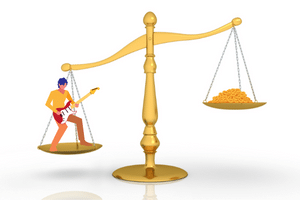
Upgrading your guitar or amplifier is like hitting the next level in a video game – it opens up new possibilities, challenges, and rewards. But when is the right time to make the leap? Let’s explore the reasons that might lead you to consider upgrading your gear.
Seeking A Specific Sound
As you grow as a musician, you may find yourself craving a particular sound that your current gear can’t quite achieve. Whether it’s the warm, vintage tones of classic rock or the sharp, cutting edge of modern metal, upgrading to an expensive guitar or amplifier can unlock those sounds and help you find your unique musical voice.
Expanding Your Musical Horizons
If you’re branching out into new genres or experimenting with different playing styles, an upgrade can provide the versatility you need. High-end guitars often offer a broader range of tones and playability, while expensive amplifiers come with features that allow you to shape your sound in new and exciting ways.
Professional Performance Needs
Professional-grade equipment is often a must for those taking the stage or hitting the recording studio. An expensive guitar can provide the consistency and reliability needed for live performances, while a top-tier amplifier can deliver the power and clarity that studio work demands.
Investing In Your Passion
Sometimes, the reason to upgrade is as simple as a deep love for music and a desire to invest in your passion. Owning a high-end guitar or amplifier can be a source of pride and inspiration, a tangible reflection of your commitment to your craft.
Choosing Between An Expensive Guitar And Amp

The face-off between an expensive guitar and an expensive amp is like choosing between two epic guitar solos – both can be amazing in their own right. But how do you decide which one is right for you? Here’s a step-by-step guide to help you make the perfect choice.
Remember, there’s no right or wrong answer. Take the time to explore, ask questions, and trust your instincts. Your perfect guitar or amp is out there, waiting to take your music to the next level.
Identify Your Musical Goals
What are you aiming to achieve with your music? Are you looking to perform live, record in a studio, or simply enjoy playing at home? Understanding your musical goals can guide you toward the right investment.
- Live Performers: An expensive amp might be essential for delivering the power and versatility needed on stage.
- Studio Musicians: A high-end guitar could provide the nuanced sound and playability required for recording.
Assess Your Current Gear
Take a close look at what you already have. Is your current guitar holding you back, or is it your amplifier that’s lacking? Identifying the weak link in your setup can point you in the right direction.
- Guitar Upgrade: If your guitar feels uncomfortable to play or lacks the desired tone, an upgrade here might be the key.
- Amp Upgrade: If you’re struggling to get the right sound or volume from your current amp, a high-end model could be the solution.
Consider Your Budget
It’s essential to know what you can afford and find the best value within that range.
- Balanced Approach: Sometimes, a moderate upgrade to both guitar and amp can be more beneficial than going all out on one.
- Focused Investment: If one aspect is more critical to your sound, investing more in either the guitar or amp might make sense.
Try Before You Buy
Nothing beats hands-on experience. If possible, visit a music store and try out different guitars and amplifiers.
- Feel the Guitar: Play different models to find the one that feels right in your hands and sounds great.
- Hear the Amp: Experiment with various amplifiers to find the one that delivers the sound you crave.
Using Effects Pedals To Enhance Your Sound
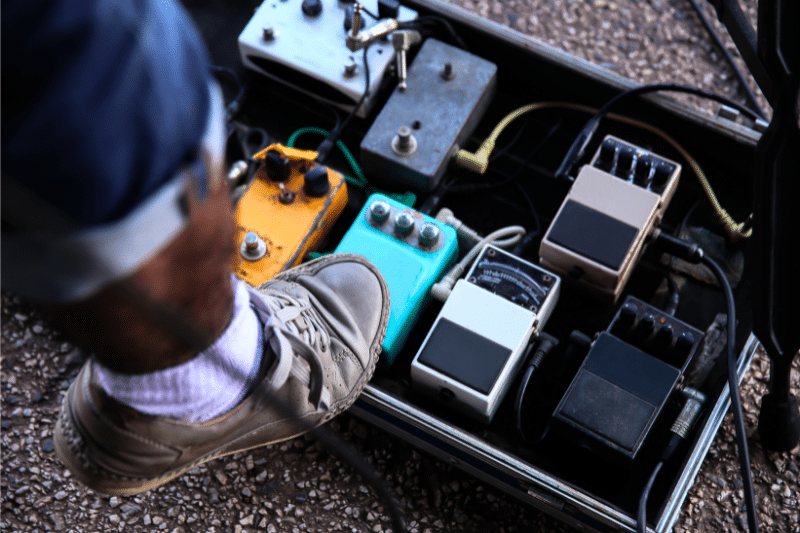
The allure of an expensive guitar or a top-tier amplifier is undeniable, but what if there’s a way to achieve that coveted sound without breaking the bank? Enter the world of effects pedals, the unsung heroes of the guitar universe!
Effects pedals are like the secret sauce of a guitarist’s sound. They allow you to shape, modify, and amplify your tone in ways that can mimic or even surpass the sound of more expensive gear. Whether you’re seeking the warm distortion of classic rock, the ethereal echoes of ambient music, or the sharp bite of modern metal, there’s likely an effects pedal that can help you get there.
Achieve Versatility
One of the great things about effects pedals is their versatility. You can mix and match them, creating a unique signal chain that reflects your musical style and personality. Want to add some reverb to your clean tone? There’s a pedal for that. Craving the saturated sound of a vintage tube amp? There’s a pedal for that too. The possibilities are virtually endless!
Pedals Save Money!
Effects pedals are also a more budget-friendly way to experiment with different sounds. Instead of investing in a high-end guitar or amplifier, you can start building a collection of pedals that offer a wide range of tones and textures. It’s like having a sonic toolbox at your feet, ready to unleash whatever sound you need at any given moment.
Supersize Your Creativity
But it’s not just about saving money. Effects pedals can also inspire creativity and open up new musical horizons. They encourage you to experiment, to push your boundaries, and to discover new ways of expressing yourself through your instrument. It’s a journey of exploration that can lead to unexpected and delightful musical destinations.
Make Expensive Guitars And Amplifiers Even Better!
If you already have an expensive guitar and amp, the right effects pedals can make them sound even better! The variety of sounds you can get from the right guitar, amp, and pedals is truly mind-boggling! For example, one overdrive pedal can sound and perform totally different than another one, depending on the unit’s construction and the guitar and amp you use with it.
The Bottom Line
Of course, like any tool, effects pedals require some knowledge and skill to use effectively. Understanding how different pedals work, how to chain them together, and how to tweak the settings to achieve the desired sound can take some time and practice. But the rewards are well worth the effort.
Effects pedals offer a powerful and accessible way to enhance your sound without the need to buy or upgrade to a more expensive guitar or amplifier. They provide a world of sonic possibilities, a pathway to creativity, and a means to make your musical voice truly your own.
So, if you’re looking to take your sound to the next level without emptying your wallet, it might be time to step into the world of effects pedals and see where they can take you.
Gear Acquisition Syndrome Is A Thing!
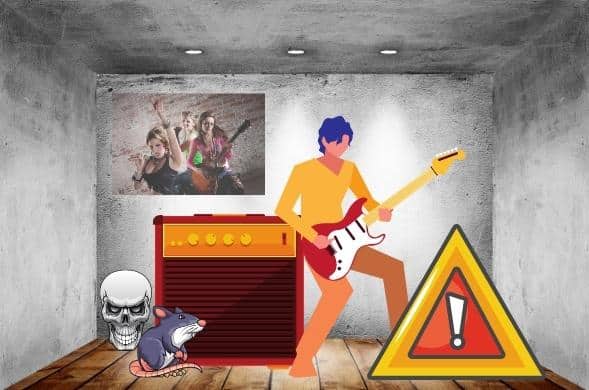
Ah, Gear Acquisition Syndrome (GAS), the delightful affliction that haunts guitarists far and wide!
If you’ve ever found yourself drooling over the latest guitar model or amp, even though you’ve got a room full of them, you might be a fellow GAS sufferer. But fear not, for you’re in good company! I’ve got it wicked bad, which makes me somewhat of an expert on the matter!
Gear Acquisition Syndrome is that irresistible urge to acquire more and more musical gear, whether it’s guitars, amps, pedals, or even picks shaped like famous landmarks. It’s the thrill of the chase, the joy of unboxing, and the sweet, sweet sound of a new toy.
Is it the glossy finish of a new guitar? The roar of a vintage amp? Or perhaps the mystical allure of a pedal that promises to make you play like Hendrix? Whatever it is, GAS is fueled by passion, curiosity, and a dash of retail marketing.
Believe it or not, GAS isn’t all bad! It drives us to explore, innovate, and push our musical boundaries. It keeps the industry alive and buzzing, and let’s face it, a new guitar day is a good day!
But beware, my fellow rockers, for GAS can lead you down a rabbit hole of endless spending and a house filled with more gear than furniture. Balance is key, and sometimes, less is more (unless it’s a limited edition, then all bets are off).
Curing GAS (Or At Least Managing It)
Is there a cure for GAS? Probably not. But here are some tips to keep it under control.
- Set A Budget: Know your limits and stick to them.
- Prioritize Needs vs. Wants: Do you really need that seventh delay pedal?
- Research Before Buying: Make informed decisions.
- Embrace The Joy Of Trading Or Selling: Out with the old, in with the new!
In the end, Gear Acquisition Syndrome is a quirky part of being a musician. It’s a love affair with sound, creativity, and the tools that make our musical dreams come true. So go on, indulge a little, but remember to play those beauties, not just collect them.
Key Takeaways

Here are the most important things to remember when buying guitars and amps.
- Upgrading your gear is not just about improving sound quality; it’s a tangible reflection of your commitment to your craft.
- Aligning your choice of musical equipment with your performance needs, whether live, studio, or casual playing, ensures that your investment serves your specific requirements.
- Hands-on experience with different guitars and amps is invaluable in finding the gear that resonates with you.
- High-end guitars and amps are not just about immediate satisfaction; they are long-term investments that can hold value and withstand the rigors of playing.
- Utilizing effects pedals can transform your sound, offering a budget-friendly alternative to expensive guitars and amps.
Frequently Asked Questions

Here are some of the questions I get asked about guitars and amplifiers.
If your question does not appear here, please put it in the comments, and I will get right back to you with an answer.
Can A Beginner Benefit From An Expensive Guitar Or Amp?
Yes, a beginner may appreciate the quality and playability of an expensive guitar or the sound control of an expensive amp. However, it’s essential to balance this investment with individual needs and budget considerations.
How Many Guitars Should A Guitarist Have?
The number of guitars a guitarist should have depends on individual needs, musical styles, and budget. There’s no fixed rule, and it can range from one for a hobbyist to several for a professional exploring different tones and tunings.
How Many Amps Should A Guitarist Have?
The number of amps a guitarist should have depends on their playing needs and musical genres. A versatile guitarist might require different amps for various tones and settings, such as studio recording, live performances, or practice at home.
However, a carefully chosen, quality amp can often serve multiple purposes, making additional amps a matter of preference rather than necessity.
How Powerful Should An Amp Be?
The power of an amp should align with the guitarist’s specific needs and playing environment.
For home practice, a small amp of 10 to 20 watts may suffice, while gigging in small venues might require 30 to 50 watts. Larger venues or playing with a full band could necessitate an amp with 50 watts or more.
The choice ultimately depends on the desired volume, headroom, and tonal characteristics.
Do Expensive Guitar Strings Sound Better?
Expensive guitar strings often provide better quality materials and manufacturing processes, which can lead to improved tone, sustain, and playability. However, the perceived improvement in sound is subjective and can vary among different players and musical styles.
Is It Better To Rent Or Buy Expensive Gear?
Renting may be a good option for short-term needs or trying out different gear, while buying is an investment in long-term use and a personal connection to the instrument.
Can I Customize A Less Expensive Guitar To Sound Like An Expensive One?
Customizing a less expensive guitar with quality pickups, hardware, and a proper setup can enhance its sound and playability, but the results may vary based on the base instrument and modifications.
Are Vintage Guitars And Amps Worth The Investment?
Vintage guitars and amps can be valuable for their unique tones and historical significance. They may also hold or increase in value over time, but condition and authenticity should be carefully assessed.
Can I Achieve A Professional Sound With Budget Gear?
Yes, professional sound can be achieved with budget guitars and amplifiers, especially with careful selection, proper setup, and the use of effects pedals to enhance the sound.
Final Thoughts

The debate between buying an expensive guitar vs expensive amp is a multifaceted one that goes beyond mere aesthetics and price tags. It’s about finding the right balance between sound, look, and feel and choosing the gear that resonates with you in all these areas. This is a complex decision-making process that many musicians face at some point.
Aligning your choice with your musical goals, preferences, and budget is an important starting point. From live performers to studio musicians, from beginners to seasoned pros, understanding these aspects can guide you to a workable choice that’s uniquely yours.
Effects pedals can be a game-changing alternative, offering a pathway to creativity and a means to enhance your sound without the need for costly upgrades. They represent a world of sonic possibilities that’s accessible to all players.
In the end, whether it’s an expensive guitar, a top-tier amp, or a clever use of effects pedals, the best choice is the one that inspires you, fuels your creativity, and allows you to express yourself in your own way. It’s a personal journey, a musical adventure, and a reminder that the joy of playing is not about the gear itself but the heart and soul of the musician.

Here’s a great video from Fender that introduces you to some of the Fender and Squier starter packs for beginners. They include a guitar, amp, and accessories. Check it out!
What To Read Next ➡ Is It Easier To Play More Expensive Guitars? Find Out Now!
Related Article ➡ Why Are Some Guitars Easier To Play? The Truth Revealed!
Tell Me What You Think
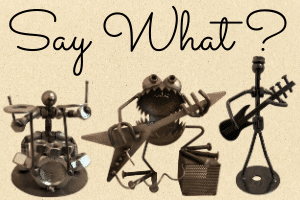
Please leave a comment below if you enjoyed this article, have any questions about guitars or amplifiers, or want to give your point of view. I will be happy to help you.
- What’s your favorite guitar and amplifier? Why?
- Do you have gear acquisition syndrome? Tell me about it!
- How important is a budget when you buy a guitar or amp?
- Do you use pedals to augment the sound of your guitar and amp?? Which ones?
- What else is on your mind?

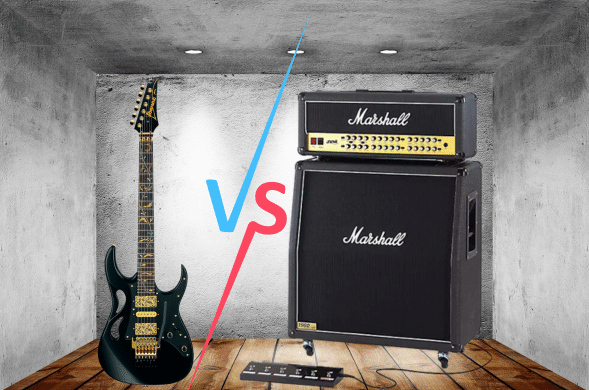

I did not know that Jimi Hendrix has a wall of Marshall amps. I feel like I have learned so much from this post. It is very informative and all around a great post. Thank you for sharing. Do you have any recommendations for a beginner when it comes to a guitar and an amp? What is a good one to practice on?
Hi, There
Yes, Jimi Hendrix was one of the pioneers of the 1960s to use multiple Marshall stacks. Check out some of his images on the internet, and you’ll find some amazing photos!
I always recommend a decent guitar and a small amp for beginners. Fender offers some great beginner packs for electric, acoustic, and bass players. They have a guitar and amp with various accessories, like a tuner, strap, picks, and an instructional manual.
Best of Luck, 😎
Frank 🎸
This blog post provides a comprehensive exploration of the “expensive guitar vs expensive amp” debate, and I found it highly informative. The article effectively breaks down the factors to consider when making this important decision, from personal connection and budget considerations to the pros and cons of each option. It also highlights the role of effects pedals in enhancing one’s sound without the need for costly upgrades.
Ultimately, the key takeaway is that the decision should align with individual musical goals and preferences. Whether you’re a beginner or a seasoned musician, finding gear that inspires creativity and resonates with your musical soul is paramount.
As a musician, I appreciate the valuable insights and tips provided here, and I’m now better equipped to make an informed decision when it comes to choosing between an expensive guitar and amp. Thank you for this informative guide!
Hi, Hanna
Thank You for your comments!
I’m glad you found this article useful.
We’re all on some kind of budget, so we have to make our guitar and amp choices wisely!
Rock On!
Frank